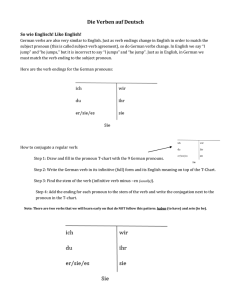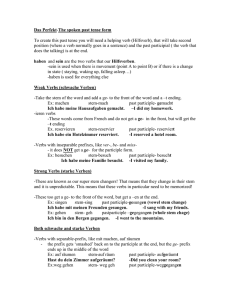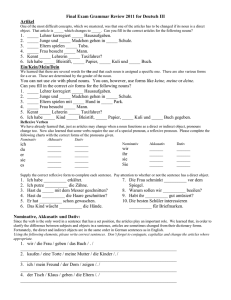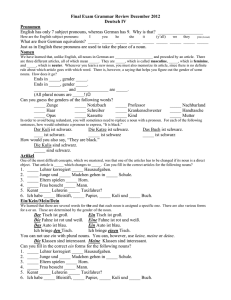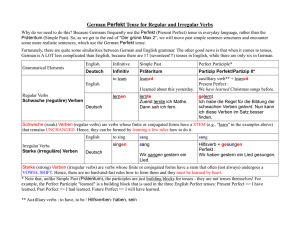Here are the English subject pronouns: I you he she it
Werbung
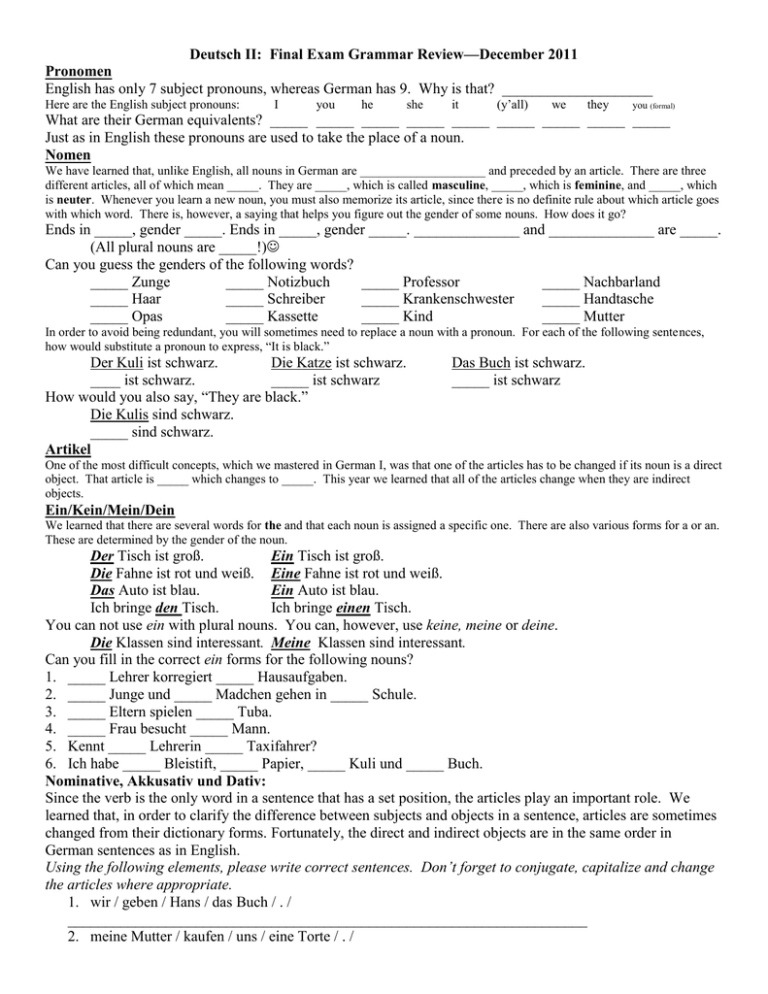
Deutsch II: Final Exam Grammar Review—December 2011 Pronomen English has only 7 subject pronouns, whereas German has 9. Why is that? ____________________ Here are the English subject pronouns: I you he she it (y’all) we they you (formal) What are their German equivalents? _____ _____ _____ _____ _____ _____ _____ _____ _____ Just as in English these pronouns are used to take the place of a noun. Nomen We have learned that, unlike English, all nouns in German are ____________________ and preceded by an article. There are three different articles, all of which mean _____. They are _____, which is called masculine, _____, which is feminine, and _____, which is neuter. Whenever you learn a new noun, you must also memorize its article, since there is no definite rule about which article goes with which word. There is, however, a saying that helps you figure out the gender of some nouns. How does it go? Ends in _____, gender _____. Ends in _____, gender _____. ______________ and ______________ are _____. (All plural nouns are _____!) Can you guess the genders of the following words? _____ Zunge _____ Notizbuch _____ Professor _____ Nachbarland _____ Haar _____ Schreiber _____ Krankenschwester _____ Handtasche _____ Opas _____ Kassette _____ Kind _____ Mutter In order to avoid being redundant, you will sometimes need to replace a noun with a pronoun. For each of the following sentences, how would substitute a pronoun to express, “It is black.” Der Kuli ist schwarz. Die Katze ist schwarz. ____ ist schwarz. _____ ist schwarz How would you also say, “They are black.” Die Kulis sind schwarz. _____ sind schwarz. Artikel Das Buch ist schwarz. _____ ist schwarz One of the most difficult concepts, which we mastered in German I, was that one of the articles has to be changed if its noun is a direct object. That article is _____ which changes to _____. This year we learned that all of the articles change when they are indirect objects. Ein/Kein/Mein/Dein We learned that there are several words for the and that each noun is assigned a specific one. There are also various forms for a or an. These are determined by the gender of the noun. Der Tisch ist groß. Ein Tisch ist groß. Die Fahne ist rot und weiß. Eine Fahne ist rot und weiß. Das Auto ist blau. Ein Auto ist blau. Ich bringe den Tisch. Ich bringe einen Tisch. You can not use ein with plural nouns. You can, however, use keine, meine or deine. Die Klassen sind interessant. Meine Klassen sind interessant. Can you fill in the correct ein forms for the following nouns? 1. _____ Lehrer korregiert _____ Hausaufgaben. 2. _____ Junge und _____ Madchen gehen in _____ Schule. 3. _____ Eltern spielen _____ Tuba. 4. _____ Frau besucht _____ Mann. 5. Kennt _____ Lehrerin _____ Taxifahrer? 6. Ich habe _____ Bleistift, _____ Papier, _____ Kuli und _____ Buch. Nominative, Akkusativ und Dativ: Since the verb is the only word in a sentence that has a set position, the articles play an important role. We learned that, in order to clarify the difference between subjects and objects in a sentence, articles are sometimes changed from their dictionary forms. Fortunately, the direct and indirect objects are in the same order in German sentences as in English. Using the following elements, please write correct sentences. Don’t forget to conjugate, capitalize and change the articles where appropriate. 1. wir / geben / Hans / das Buch / . / _____________________________________________________________________ 2. meine Mutter / kaufen / uns / eine Torte / . / _____________________________________________________________________ 3. ich / zeigen / dir / der Dom / . / _____________________________________________________________________ 4. Klaus / geben / mir / der Stuhl / . / _____________________________________________________________________ 5. Axel und Manfred / kaufen / sich / die Bonbons / . / _____________________________________________________________________ Regulare Verben im Präsens Verbs are words which show action in a sentence. In German all verbs end in either _____ or _____. Before you can use them in a sentence, you must conjugate them. That means that you change them so that they match the subject. This simple three-step process consists of: 1. Taking off the ______________________. 2. Writing down the ____________________ after each subject pronoun. 3. Adding the _________________________. Let’s see if you can apply the rules to the following verbs. machen schreiben spielen kommen tun -ich ____________ ____________ ____________ _________ ______ -du ____________ ____________ ____________ _________ ______ -er,sie,es ____________ ____________ ____________ _________ ______ -ihr ____________ ____________ ____________ _________ ______ -wir,sie,Sie ____________ ____________ ____________ _________ ______ Some verbs, however, need special attention. They need to add or delete a letter in order to make pronunciation easier. Can you conjugate these verbs? wandern arbeiten finden heissen tanzen -ich ____________ ____________ ____________ _________ ______ -du ____________ ____________ ____________ _________ ______ -er,sie,es ____________ ____________ ____________ _________ ______ -ihr ____________ ____________ ____________ _________ ______ -wir,sie,Sie ____________ ____________ ____________ _________ ______ Which form did you have to change for wandern? __________ What did you have to add to arbeiten and finden? __________ What did you leave off of heissen and tanzen? __________ Irregulare Verben Though most verbs are regular, there are some verbs which have to be memorize. Fortunately there are very few of these. Three, however, are: sein- ___ ___ haben- ___ _______ werden-___ _______ -ich __________ __________ __________ -du __________ __________ __________ -er,sie,es __________ __________ __________ -ihr __________ __________ __________ -wir,sie,Sie __________ __________ __________ The rest of the irregular verbs have a easy pattern for conjugation. Do you know how to conjugate the following irregular verbs? fahren laufen sprechen essen sehen lesen -ich __________ _________ __________ __________ __________ ______ *du __________ _________ __________ __________ __________ ______ *er,sie,es __________ _________ __________ __________ __________ ______ -ihr __________ _________ __________ __________ __________ ______ -wir,sie,Sie __________ _________ __________ __________ __________ ______ What are the only two conjugations that differ from the way you do a regular verb? _____ and _____ What did you change about these forms for fahren and laufen? The ____ changed to an _____. for sprechen and essen? The ____ changed to an _____. for sehen and lesen? The ____ changed to an _____. Modal Verben Modal verbs express how one ______ about an action. They do not express the action itself; therefore, they must accompany an action verb. These verbs have a different way of conjugating. können müssen wollen möchten -ich ____________ ____________ ____________ _________ -du ____________ ____________ ____________ _________ -er,sie,es ____________ ____________ ____________ _________ -ihr ____________ ____________ ____________ _________ -wir,sie,Sie ____________ ____________ ____________ _________ Sollen, dürfen, and mögen are also modal verbs. When there is more than one verb in a sentence, they cannot both be in the coveted second position. One must go to the end of the sentence, my friend. Can you rewrite these sentences to include the modal verbs? Remember the C-clamp! Ich spiele Tennis. (können) _____________________________________________ Gehst du ins Kino? (wollen) _____________________________________________ Trennbare Verben There are some verbs that are made up of two parts, a prefix and the verb itself. In English the equivalents of these verbs tend to have prepositions. When we conjugate these, they split in half and the prefix goes on the end of the sentence. (einkaufen) Ich __________ bei Kroger’s _____. (mitkommen) __________ du morgen _____? (aufräumen) Wir __________ das Zimmer _____. (aufmachen) Ihr sollt das Paket _______________. Wortstellung In addition to learning lots of vocabulary and memorizing the articles, we also learned how to put the vocabulary into sentences. When we do that, what is the normal order for a statement? ______ then _______ for a question? ______ then _______ Underline the verbs in the following exercise, then make sentences or questions with the elements? 1. besuchen / ich / meine Oma / . / ______________________________________________ 2. Hausaufgaben / machen / wir / . / ______________________________________________ 3. du / bringen / die Musik / ? / ______________________________________________ 4. arbeiten / am Wochenende / er / ? / ______________________________________________ When we have verbs with separable prefixes, we remove the prefix and place it at the end of the sentence before conjugating the verb. 5. wir / einkaufen / morgen / . / ___________________________________ 6. mitkommen / heute / du / ? / ___________________________________ Adjektiven und Adverbien: Komparativ und Superlativ In order to compare attributes of two or more things, we use the comparative and superlative forms of the adjectives. In English this sometimes means that we add “more” or “the most” in front of the adjective. This is never the case in German. For comparative form the formula is: adjective + _____________ + ________________________ For superlative form the formula is: _____ + adjective + _____________+ ________________________ Komparativ Superlative nett warm gut We have also covered several different culture and vocabulary topics. Be sure to also review the vocab related to the poem, as it will play a major role. Know the nouns and their articles! Questions for Frau Dieckman? Email [email protected] Perfekt Once we mastered all of those basic concepts, we learned how to communicate in the conversational past tense. This form requires a helping verb and a past participle. The formula for making this tense with weak verbs is: __________ + _ _ + ________ + _ This formula is slightly altered if the verb has an inseparable prefix, a separable prefix or if it is French! Can you write the following sentences in the past tense? 1. Ich spiele Tennis Ich __________ Tennis ____________________. 2. Wir tanzen nicht gern. _____________________________________________________ 3. Kaufst du ein? _____________________________________________________ 4. Ihr besucht die Oma. _____________________________________________________ 5. Vati repariert mein Fahrrad. _____________________________________________________ For strong verbs, you had to determine which helping verb to use and had to memorize the past participle. 1. Die Kinder essen kein Gemüse. _____________________________________________________ 2. Trinkst du Milch? _____________________________________________________ 3. Fritz und ich schlafen im Park. _____________________________________________________ 4. Ingo geht nach Hause. _____________________________________________________ 5. Ich bin 14 Jahre alt. _____________________________________________________ When would you use sein as the helping verb? ______________________________________________ We have also covered several different vocabulary topics. Be sure to review the vocab related to the poem, as it will play a major role. Know the nouns and their articles. Questions for Frau Dieckman????? Email [email protected] Präteritum As with English, there are ___ different ways to make past tense. The Imperfect (Präteritum) is the one word form of the past tense. It is used for ________________ about past events, except when writing personal letters. All of these are conjugated like modal verbs; however, there is only a formula for the weak verbs: _______________ + _____ + modal conjugation Can you write the following sentences in the imperfect tense? 1. Ich spiele Tennis Ich _______________ Tennis. 2. Kaufst du ein? _____________________________________________________ 3. Vati repariert mein Fahrrad. _____________________________________________________ 4. Ihr besucht die Oma. _____________________________________________________ 5. Wir tanzen nicht gern. _____________________________________________________ For strong verbs, you had to memorize the imperfect form and conjugated it like a modal verb. 1. Ich bin 14 Jahre alt. _____________________________________________________ 2. Trinkst du Milch? _____________________________________________________ 3. Ingo geht nach Hause. _____________________________________________________ 4. Fritz und du schlaft im Park. _____________________________________________________ Die Kinder essen kein Gemüse. _____________________________________________________
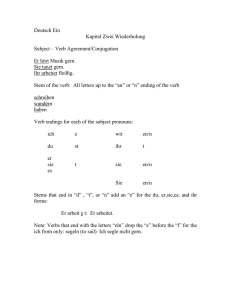
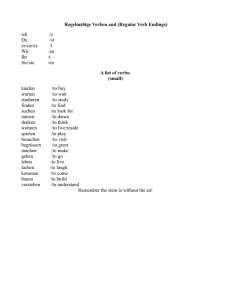
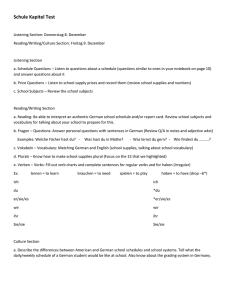
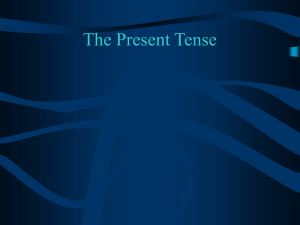
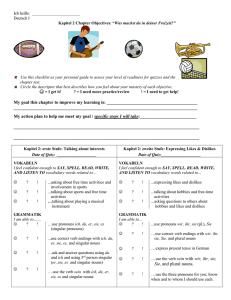
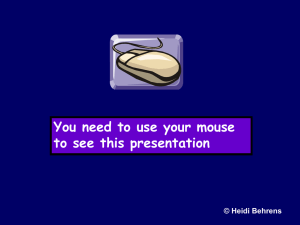
![D1A70204 Befehlformen [Command Forms] Commands (Befehle](http://s1.studylibde.com/store/data/006295093_1-ded304d13987e352eae01a2a5fa30f24-300x300.png)
